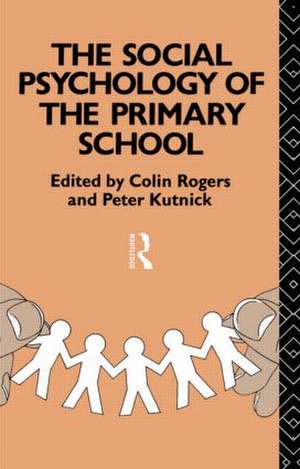The Social Psychology of the Primary School
Editat de Colin Rogers, Peter Kutnicken Limba Engleză Paperback – 2 apr 1992
Preț: 478.51 lei
Nou
Puncte Express: 718
Preț estimativ în valută:
91.58€ • 95.36$ • 77.39£
91.58€ • 95.36$ • 77.39£
Carte tipărită la comandă
Livrare economică 10-24 martie
Preluare comenzi: 021 569.72.76
Specificații
ISBN-13: 9780415071970
ISBN-10: 0415071976
Pagini: 272
Dimensiuni: 138 x 216 x 15 mm
Greutate: 0.36 kg
Ediția:Revised
Editura: Taylor & Francis
Colecția Routledge
Locul publicării:Oxford, United Kingdom
ISBN-10: 0415071976
Pagini: 272
Dimensiuni: 138 x 216 x 15 mm
Greutate: 0.36 kg
Ediția:Revised
Editura: Taylor & Francis
Colecția Routledge
Locul publicării:Oxford, United Kingdom
Cuprins
Figures and Tables Contributors Acknowledgements 1. Process and Structure in the Primary School Peter Kutnick and Colin Rogers 2. Grouping and Group Work Maurice Galton 3. Social Interaction in the Classroom Jane French 4. Classroom Discourse and Classroom Knowledge Derek Edwards 5. Self-Concept and School Achievement Dale. H. Schunk 6. Motivation in the Primary Years Colin Rogers 7. Social Development of the Child and the Promotion of Autonomy in the Classroom Peter Kutnick 8. Towards an Adequate Conception of Early Moral Development Derek Wright 9. The Role of Play in the Nursery and Primary School Curriculum Peter K. Smith 10. The Nature of Friendship in the Primary School William Maxwell 11. Sex Roles in the Primary Classroom Paul Croll and Diana Moses 12. Interaction with Children with Special Educational Needs David Galloway 13. Co-operative Learning Robert E. Slavin 14. Individuals, Groups and Interventions Colin Rogers and Peter Kutnick Author Index Subject Index
Descriere
Colin Rogers and Peter Kutnick reassess the role of social psychology in educational practice for the primary classroom. They offer an analysis of the ways in which the process and structure of classroom life affect the interpersonal and academic outcomes of schooling. Social schooling is seen to have a crucial role to play in achieving effective teaching and meaningful learning, while promoting other useful developments in the primary classroom. The authors study classroom interaction and relationships and consider how these might be structured for the best outcomes. With so much attention being focused recently on the National Curriculum, the authors provide a balance for the current curricula-orientated view of teaching by improving understanding of how curricula are implemented in the classroom. Motivation and the social development of primary age children are covered as well as relationships and social interaction in the classroom, gender and special educational needs.
















